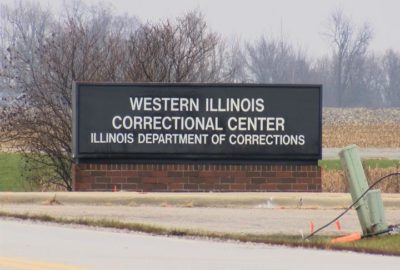A trial for two Western Illinois Correctional Facility guards facing conspiracy and deprivation of civil rights charges in the beating of an inmate had their jury trial pushed back to March early this month due to issues with COVID-19.
A prosecuting attorney in the case says a possible resolution of the case might come sooner than that. Attorney Jon Erickson of Chicago, who is representing the family of inmate Larry Earvin, who died from injuries sustained in a deadly beating allegedly at the hands of prison guards Alex Banta, Willie Hedden, and Todd Scheffler, says that the U.S. District Court for the Central District of Illinois in Springfield has notified him of a potential settlement hearing: “The Earvin Family has been seeking justice in this case for years. They deserve justice. There is an opportunity here for them to get justice. The state has agreed to participate in a settlement conference, and the Earvin family is optimistic and remains hopeful that the state will take responsibility for this heinous murder at the hands of Illinois Department of Corrections employees. We’ll remain optimistic that justice will prevail.”
Hedden pleaded guilty in March of last year to conspiracy to deprive civil rights, deprivation of civil rights, and conspiracy to engage in misleading conduct in connection with the death of the 65 year old Earvin, who was serving a six-year sentence for a robbery conviction in Cook County. Hedden will be sentenced on April 11th and could face up to life in prison.
Banta and Scheffler are due back in court on March 28th after their attorneys asked for a continuance at a hearing held two weeks ago. Jury selection was delayed to March 28th, with the two to three-week trial starting after that. Banta’s attorney asked for the delay, saying that Banta is still suffering after a recent bout with COVID-19.
Erickson says that prosecutors in the case were going to highlight various other lawsuits by other inmates as well as a report by WBEZ and the John Howard Group, a prison watchdog group, about the lack of oversight at the prison and its history of allegedly beating inmates out of the site of surveillance cameras. The Illinois Department of Corrections says it has now fixed the “blind spot” in the prison with video surveillance. Erickson says that the federal government’s prosecution intends to demonstrate that there is a “prevailing culture” of beatings that occurred at the facility. WBEZ says that Governor J.B. Pritzker and the Illinois Director of Prisons Rob Jeffreys have declined multiple requests for comments and interviews about staff abuse and accountability through the state’s prison system, and specifically about this case.
Erickson could not reveal any details of a potential settlement in the case, but remained optimistic that justice would be done for the Earvin family. Erickson says in the meantime he is working with 8th District State Representative LaShawn Ford of Chicago on changing laws on indemnification and closing a loophole of liability: “The Attorney General [Kwame Raoul] is relying on what’s titled and referred to as the ‘State Employee Indemnification Act,’ which states that the Attorney General is precluded from indemnifying a judgement or a settlement in a lawsuit if it’s determined that the conduct of the state employee willful, wanton, and intentional. The problem with that is that he is relying on that section of this statute in only this case and only in this case was it pertaining to just 4 of the murderers. Although it is clear that multiple people participated in the actual murder or assisted the officers that did the actual murder and then participated in the conspiracy to cover it up. Those people are all still liable. What this legislation is designed to do is to take away this block that the Attorney General is claiming prohibits him from indemnifying the four core perpetrators, at least the 3 that have been indicted in the federal criminal case. We know that he is using this statute arbitrarily because the State of Illinois settled hundreds of civil rights violation cases from the Illinois Department of Corrections. In each and every one of them, the burden of proof that a plaintiff must demonstrate is that the conduct was willful, wanton, or intentional. That’s the burden of proof, so he’s cherry-picking this case to apply this statute. Representative Ford’s legislation takes away that language so that the Attorney General is no longer in a position to capriciously or arbitrarily or based on financial decisions to deny justice to families whenever he feels like it.”
Erickson says Ford’s legislation has nothing to do with qualified immunity for state employees on the job: “This is absolutely, 100% not in any way related to qualified immunity. It’s a wholly, completely different idea. Qualified immunity has to do with a defense to the actual conduct and the litigation as to the liability for the conduct. It has nothing to do with funding in the judgment, should there be one. Qualified immunity is a defense that officers can put forth. This indemnification comes into play after they have already been found guilty or liable, and the question is, ‘Where does the money come from to pay for the judgment that the jury imposes?’ Representative Ford’s bill would in no way touch upon, even remotely, qualified immunity at all.”
Ford’s House Bill 4119 currently is in committee in the Illinois General Assembly and awaits a call to the floor for a debate.
The settlement conference between the federal government with Banta and Scheffler in the Illinois federal court has not yet been announced.




